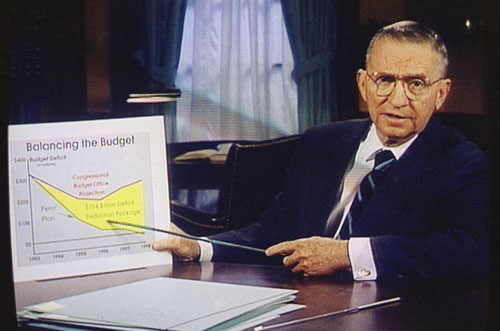by WorldTribune Staff, July 10, 2019
Ross Perot, legendary for his generosity and a political maverick who many analysts say paved the way for populist presidential campaigns, passed away on July 9 at age 89.
In March, Perot’s son wrote two checks of the maximum legal limit to President Donald Trump’s re-election campaign, Fox News reported.

“Like Trump, Perot ran as a billionaire populist against the Republican establishment,” Bradford Betz wrote for Fox News. “His focus on the North American Free Trade Agreement – rather than the national debt – and his use of cable news for laying out his agenda were both familiar elements of Trump’s campaign.”
Democratic strategist James Carville said in a 2016 podcast: “If Donald Trump is the Jesus of the disenchanted, displaced non-college white voter, then Perot was the John the Baptist of that sort of movement.”
Betz noted that, in 2000, “Trump briefly considered running for president in Perot’s Reform Party before scrapping the idea. Perot’s model, of running as a third-party candidate in a two-party political system, taught Trump that he needed to run as a Republican in 2016 – a lesson that ultimately led to his victory.”
Writing for The American Spectator, columnist Dan Flynn noted that Perot became a billionaire after taking out a $1,000 loan to start Electronic Data Systems (EDS).
“He paid for the wives and children of prisoners of war to picket the North Vietnamese embassy in Paris. He oversaw the private commando mission that freed EDS employees imprisoned in Iran during the Islamic Republic’s early days (a mission overseen by Jimmy Carter to free other hostages failed). He gave much of what he made — visitors to Dallas see the many examples of his generosity. And, yes, he ran for president twice, garnering 19 percent in his first run in 1992. The last time a third-party candidate performed so well occurred in 1912 when Theodore Roosevelt, a man in many ways similar to Perot, placed second. Easy to caricature, Perot nevertheless exhibited great character. Do we see his likes again?”
Trump owes much of his political success to Perot, Flynn noted.
“Perot proved that Americans still love a success story. They do not hate billionaires. They admire them (mostly). Perot, like Trump, shot from the lip. Perot, like Trump, ran against (and above) the parties. And perhaps most importantly, Perot ran as a populist.
“Issues of trade animated both. But similarities in style trumped ones of substance. People sick of politics as usual voted for both. One imagines that if Perot had not opted to drop out in the summer before rejoining the race in the fall, we could be mourning the death of a president today. Historians associate populism with leftish movements that manage to attract left-out segments. Think William Jennings Bryan or Sockless Jerry Simpson or Huey Long (do read about these characters in A Conservative History of the American Left). But populism can characterize right-leaning figures (Joe McCarthy, Pat Buchanan, Donald Trump), and in the unusual case of Ross Perot, a centrist, too.”
Intelligence Brief __________ Replace The Media
